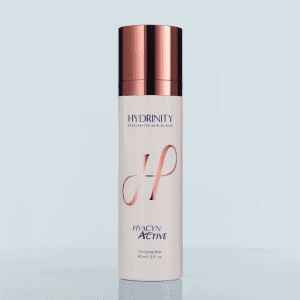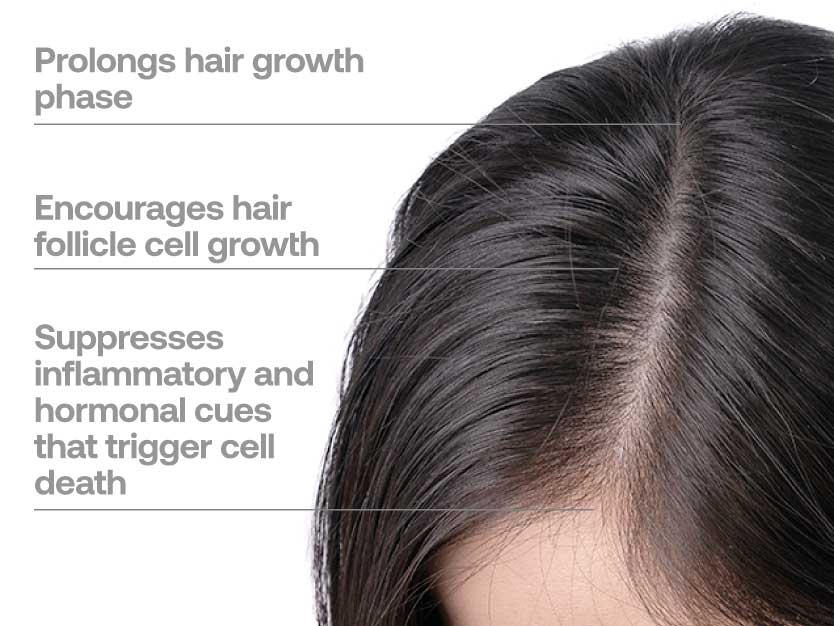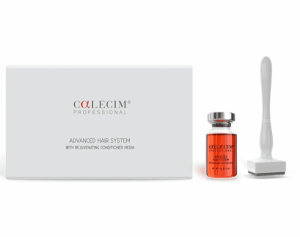CALECIM® Professional Stem Cell Hair Revitalisation
STEM CELLS FOR HAIR
It is estimated that 40% of women and 85% of men suffer from hair loss or thinning before the age of 50. CALECIM® Professional offers a new non- surgical solution, based on the same proprietary technology derived from mesenchymal stem cells that is found in its revolutionary post- procedure products and anti-ageing skincare range.
CALECIM® Professional Advanced Hair System contains a high concentration of Rejuvenating Conditioned Media, which contains powerful stem cell derived growth factors, to help promote fuller looking hair. This active ingredient works with in-clinic hair regrowth treatments and hair transplant procedures by providing a nutrient- rich micro environment to help boost a regenerative response.
Q&A with Kelly Morrell
Founder of Scalp Confidential, UK
What role does the hair follicle play in hair thinning?
From the moment we are born, our hair follicles undergo a repetitive sequence of growth and rest. This hair cycle consists of the relatively well-known anagen, catagen and telogen phases, plus an additional exogen phase.
The anagen phase typically lasts 3 to 7 years on average. Approximately 80 to 90% of the hair follicles should be in this growing phase at any one time in a healthy head of hair. To explain the complexity of the cycle in short, hair morphogenesis consists of mesenchymal cells forming a dermal papilla and in turn melanocytes migrate into the bulb to provide pigment.
There are many often-complex reasons this cycle is either disrupted or impaired. Factors such as genes, hormones, stress, medication, diet, malnutrition, underlying health conditions such a thyroid issue or anaemia, the use of styling chemicals, direct heat and general hair products can all affect the hair growth cycle and the quality of hair.
It is quite common to find several of these contributing factors at any one time. The hair follicle needs a balance of good blood supply, healthy connective tissue and balanced hormones.
Why is a nutrient-rich micro environment important for cell regeneration and hair follicle development?
Essentially, when the hair growth cycle is interrupted and the environment is unhealthy, there are a number of disorders that can occur, with or without the genetic factors present. A vitamin or mineral deficiency, inflammation and impaired cell immunity can all interrupt the hair growth cycle.
Corrective measures which promote anti-inflammatory, anti- oxidative effects to help increase cell signalling and fresh oxygenated blood flow to the area should be considered when putting together a treatment management plan.
How does CALECIM® Professional Advanced Hair System work to promote denser, fuller-looking hair?
CALECIM® Professional Advanced Hair System is a stem cell-derived serum containing key proteins and growth factors to help stimulate, nourish and condition the appearance of weak and struggling hair follicles. When infused into the scalp with a derma stamp or micro needling device, these powerful proteins are more likely to provide hair follicle support and visibly condition the skin on the scalp.
In vitro results showed a cell growth of 24.1% with CALECIM® Professional Advanced Hair System, when compared to a dermal papilla cell growth of 24.5% with use of Minoxidil at a concentration of 2ug/ml, making this a good drug-free option.
What types of hair loss can Advanced Hair System treat?
CALECIM® Professional Advanced Hair System could potentially help to manage a number of hair loss conditions, depending on the severity.
Traditional first-line therapies would be Minoxidil 2% or 5% and 1mg to 2.5mg of Finasteride and in some cases 5mg, for example. There is an increasing demand for alternative treatments such as CALECIM® Professional Advanced Hair System because clients have access to online information and arrive well informed about the possible side effects of traditionally used drugs.
I have found it can help with Telogen Effluvium, post-partum hair loss and Traction Alopecia, especially when identified early. When I assess a client’s scalp using a microscope, I have noticed a reduction in visible inflammation after treatment with CALECIM® Professional.
What is your treatment protocol?
Treatment protocol is really quite straight forward and very quick for both the client and practitioner. The patient should attend clinic with clean hair and no product applied.
To clean the skin on the scalp, I usually use Chlorhexidine 0.5% or Clinisept prep & procedure solution.
The needle depth I use can range from 0.5mm to 1.5mm, depending where one is treating on the scalp – 0.5mm to 0.6mm across hair line and temple area, and 1.0mm to 1.5mm for vertex and crown area.
For targeted areas, I apply 2.5ml of CALECIM® Professional Advanced Hair System and massage in. The client can then take the remainder home and apply the next day with clean hands. For larger affected areas the entire bottle may be needed during the in- clinic application. The hair should not be washed for 24 to 48 hours.
The entire procedure takes around 20 minutes and an initial course of 6 is recommended; one treatment per week for 6 weeks. For more advanced or complex hair loss issues, a course of 12 is recommended. Maintenance should be one top-up treatment every 3 to 6 months depending on severity of hair loss.
What visible effects are you observing, and in what time period?
What really impresses me the most is the timeframe in which results start to appear. Clients can be notoriously impatient, and usually anything which impacts the hair takes 3 to 6 months to show. So, when new vellus hairs are visible at 5 and 6 weeks, it seemed far too early. Immediate thoughts were the effects would be short lived, however that is not necessarily the case. Depending on the condition being treated, some clients have reported long term results while others have needed further treatments or maintenance sessions. Results vary in everyone, but essentially suitable client selection is key.
I would not recommend CALECIM® Professional Advanced Hair System treatment (or PRP for that matter) to someone with advanced or extreme hair loss where all follicle activity has ceased, however in early stages of many types of hair loss it can help achieve remarkable results.
Can it be used to enhance other in-clinic hair regrowth treatments?
I regularly use CALECIM® Professional Advanced Hair System in combination with other in-clinic treatments or as part of a long-term management plan. It can be used with PRP to help boost results or as an alternative when PRP is not ideal for the patient. It can also be used in combination with hair growth supplements.
There has been research into combining CALECIM® Professional Advanced Hair System with hair transplant procedures. The protocol is 2.5ml applied to the donor site immediately after the procedure and also very carefully 2.5ml to the recipient site (a 5ml bottle in total).
What has been your clients’ reactions to CALECIM® Professional Advanced Hair System?
My clients’ reactions have been extremely positive; they report their scalp is less visible, which in turn builds their confidence, their hair appears thicker, shinier, healthier and in better condition. The hair also appears darker in a lot of cases.
Why do you recommend CALECIM® Professional Advanced Hair System to your colleagues?
I believe CALECIM® Professional Advanced Hair is a perfect way to introduce hair loss treatment to an existing clinic treatment menu. I find an armoury of effective treatment possibilities to call on is ideal when treating hair loss. CALECIM® Professional Advanced Hair System can be carried out by a therapist or nurse, freeing up a surgeon’s time, but still adding value and revenue to the clinic.
References:
https://calecimprofessional.com/blogs/blog/stem-cell-hair-revitalisation
https://www.mdpi.com/2073-4409/8/5/466
https://app.swipe.direct/c/pFF
https://calecim.ac-page.com/ahs-launch-uk
https://calecimprofessional.com/pages/clinical-abstract-dr-daniel-sister
https://calecimprofessional.com/pages/clinical-abstract-dr-shirin-lakhani
https://calecimprofessional.com/pages/science
https://www.ncbi.nlm.nih.gov/pmc/articles/PMC6380979/





